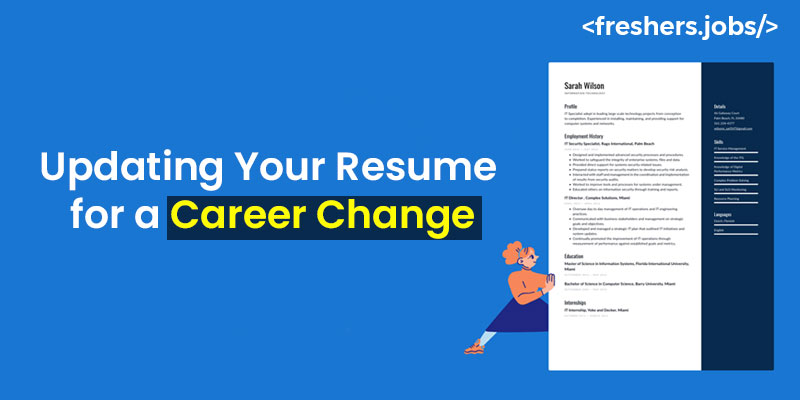Updating your resume for a career change can be an important step towards pursuing a new professional path that aligns with your evolving goals and aspirations. Transitioning into a different field or industry requires a strategic approach to showcase your transferable skills, experiences, and qualifications in a way that appeals to potential employers.
By revamping your resume, you can effectively communicate your value and demonstrate your suitability for the desired career change resume. This guide provides valuable insights and practical tips to help you navigate updating your resume, enabling you to confidently pursue new opportunities and embark on a rewarding career journey.
Importance of Updating your resume for a Career Change
When contemplating a career change or other job opportunity, updating your resume becomes crucial and can significantly impact your success in transitioning to a new field or industry. Your resume is your professional introduction, providing employers with a snapshot of your skills, experiences, and qualifications. Here are several reasons why updating your resume is of utmost importance when embarking on a career change:
Showcasing Relevant Transferable Skills: While your previous work experience may not directly align with your desired career change, updating your resume allows you to highlight transferable skills applicable across industries. By carefully selecting and emphasising communication, problem-solving, leadership, or project management skills, you can demonstrate your ability to adapt and thrive in the new freshers jobs role.
Emphasising Relevant Accomplishments: Your resume should showcase achievements relevant to your new field or industry. You can reframe and rephrase your accomplishments by updating your resume for career change to highlight their transferability and relevance. This helps potential employers understand how your past achievements can translate into success in the new career.
Update your resume and start applying for jobs from freshers jobs in Ahmedabad.
Tailoring Your Resume to the Targeted Role: Updating your resume enables you to customise it specifically for the targeted role or industry. You can modify the summary or objective statement, reorganise sections, and emphasise experiences and skills that directly align with the new career. This tailored approach increases the chances of capturing the attention of hiring managers and demonstrating your skills suitability for the desired role.
Demonstrating Commitment and Adaptability: A well-updated resume for switching careers reflects your commitment to making a career change and your willingness to adapt to new challenges. It shows that you have taken the time and effort to research the industry, acquire new skills, and position yourself as a strong candidate for the desired role. This level of dedication and adaptability can impress potential employers and instil confidence in your ability to succeed in your new career.
Overcoming Perception Challenges: A career change may raise questions for potential employers regarding your qualifications and commitment to the new field. By updating your resume, you can address these concerns proactively. You can use your resume to highlight relevant courses, certifications, or volunteer experiences, demonstrating your commitment to acquiring the necessary knowledge and skills for the career change. This helps overcome perception challenges and positions you as a serious and capable candidate.
Networking and Job Search Efforts: Updating your resume is essential when networking or applying for positions in your desired field. Networking events, career job fairs, and online platforms often require submitting a resume to initiate connections and express interest in opportunities. An updated career switch allows you to seize networking opportunities and effectively engage in job search efforts, maximising your chances of finding suitable career change options.
Personal Branding and Confidence Building: Updating your resume allows personal branding and self-reflection. It lets you craft a narrative highlighting your unique strengths, experiences, and qualifications. This process enhances your self-awareness and boosts your confidence as you align your personal brand with the desired career change. A well-crafted and updated resume helps you articulate
your value proposition clearly, creating a strong foundation for personal branding.
How to update your resume for a career change
Step 1: Research and Understand the Targeted Field
Before updating your career change resume, research the field or industry you are transitioning into. Gain an understanding of the skills, qualifications, and experiences highly valued in the new career. Look for common keywords, industry-specific terminology, and desired certifications. This research will serve as a foundation for updating your resume and tailoring it to the needs of the new field.
Step 2: Identify Transferable Skills
Review your current and past experiences to identify transferable skills for the new career. These are skills that can be transferred and utilised in different contexts. Examples of transferable skills include communication, problem-solving, leadership, project management, and critical thinking. Analyse your experiences and identify instances where you have demonstrated these skills. Highlight them in your resume, emphasising how they can contribute to success in the targeted role.
Step 3: Highlight Relevant Accomplishments
Examine your professional history and identify relevant accomplishments to the desired career. Even if your previous job titles or industries differ, there are likely achievements that can be reframed to highlight their transferability. For each accomplishment, focus on the results, impact, and skills utilised for a resume for career switch. Use quantifiable metrics whenever possible to demonstrate the scope and significance of your achievements. You can demonstrate your ability to succeed in the new career by showcasing relevant accomplishments.
Step 4: Customize Your Resume for the Targeted Role
Tailor your resume to the targeted role or industry. Start by revisiting the summary or objective statement at the beginning of your resume. Modify it to align with your career change resume and emphasise your enthusiasm and qualifications for the new field. Consider rearranging sections to prioritise the most relevant information. Review and rephrase content for each section (such as work experience, education, or skills) to highlight relevant experiences and accomplishments. Use industry-specific language and keywords to demonstrate your familiarity with the field.
Step 5: Acquire Additional Skills and Knowledge
To strengthen your candidacy for a career change, consider acquiring additional skills and knowledge valued in the new industry. Take relevant courses, pursue certifications, or engage in volunteer work related to the targeted field. Include these new experiences in your resume, demonstrating your proactive approach to learning and adapting to the new career. You can alleviate potential employer’s concerns regarding your qualifications by showcasing your commitment to acquiring new skills.
Step 6: Network and Seek Industry Insights
Networking is crucial when undergoing a career change. Engage with professionals in the desired field to gain insights and build connections. Attend industry events, join online communities, and participate in informational interviews. These interactions can provide valuable insights that inform your resume updates. Seek advice from individuals who have successfully made similar career transitions. Their experiences and guidance can help you shape your resume effectively and navigate the career change process more smoothly.
Step 7: Proofread and Seek Feedback
Before finalising your updated resume for career change, proofread it meticulously to ensure accuracy, clarity, and professionalism. Look for spelling and grammatical errors, consistency in formatting, and overall readability. Consider seeking feedback from trusted individuals, such as mentors, career coaches, or colleagues. They can provide valuable insights and suggestions to improve your resume’s effectiveness and alignment with the new career.
Step 8: Update Your Online Presence
In today’s digital age, updating your online presence to align with your career change is essential. Update your profile to reflect your new career goals, skills, and experiences. Make sure your online profiles and professional websites are consistent with the information presented in your resume. This cohesive online presence reinforces your commitment to the career change and provides potential employers with a comprehensive view of your qualifications.
Step 9: Continuously Adapt and refine
Remember that updating your resume for a career change is an ongoing process. As you gain new experiences, skills, and insights, adapt and refine your resume accordingly. Regularly review and update your document to reflect the most relevant and recent information. Stay informed about industry trends and changes, and make necessary adjustments to your resume to remain competitive and compelling to employers in the new field.
To get your dream job start applying for the latest openings in Wipro jobs for Freshers.
Updating your resume for career change is critical in presenting yourself as a qualified and capable candidate in your desired field. By tailoring your resume to highlight transferable skills, relevant accomplishments, and customised content, you can effectively communicate your value to potential employers. Additionally, acquiring additional skills, seeking industry insights, and continuously adapting your resume ensure that you remain competitive in the changing job market. With a well-updated resume, you can confidently embark on your career change journey, opening doors to new job opportunities and setting yourself up for success in your chosen field.




